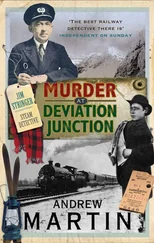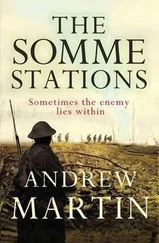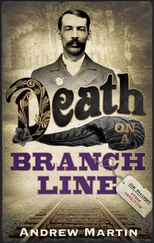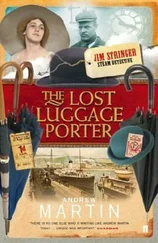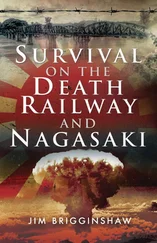Andrew Martin - The Necropolis Railway
Здесь есть возможность читать онлайн «Andrew Martin - The Necropolis Railway» весь текст электронной книги совершенно бесплатно (целиком полную версию без сокращений). В некоторых случаях можно слушать аудио, скачать через торрент в формате fb2 и присутствует краткое содержание. Жанр: Детективная фантастика, на английском языке. Описание произведения, (предисловие) а так же отзывы посетителей доступны на портале библиотеки ЛибКат.
- Название:The Necropolis Railway
- Автор:
- Жанр:
- Год:неизвестен
- ISBN:нет данных
- Рейтинг книги:5 / 5. Голосов: 1
-
Избранное:Добавить в избранное
- Отзывы:
-
Ваша оценка:
- 100
- 1
- 2
- 3
- 4
- 5
The Necropolis Railway: краткое содержание, описание и аннотация
Предлагаем к чтению аннотацию, описание, краткое содержание или предисловие (зависит от того, что написал сам автор книги «The Necropolis Railway»). Если вы не нашли необходимую информацию о книге — напишите в комментариях, мы постараемся отыскать её.
The Necropolis Railway — читать онлайн бесплатно полную книгу (весь текст) целиком
Ниже представлен текст книги, разбитый по страницам. Система сохранения места последней прочитанной страницы, позволяет с удобством читать онлайн бесплатно книгу «The Necropolis Railway», без необходимости каждый раз заново искать на чём Вы остановились. Поставьте закладку, и сможете в любой момент перейти на страницу, на которой закончили чтение.
Интервал:
Закладка:
Andrew Martin
The Necropolis Railway
Chapter One
Saturday 14 November 1903
With the letters from Rowland Smith in my pocket, I had a lively ride from York to London: just four and a half hours in all. The engine was one of the new Atlantics of Mr Ivatt, and when she came down Stoke Bank I put aside The Railway Magazine I was reading, and leant out the window at the carriage end to experience the amazing velocity.
After Peterborough I took down my box and opened the parcel my dad had packed for me, which turned out to contain three tubs of Melton cream for my boots, and two tins of Nugget's polish, also for my boots. My dad was red-hot for smartness, smart boots especially. There was an alarm clock too – which was the next best thing to Dad coming with me because he'd always woken me up himself at home – and a green Lett's pocket diary, which might seem an out of the way sort of thing to give somebody, November sort of time, but I knew it was the kind of thing Dad would have thought gentlemanly.
I opened the first page, which was headed 'The King and the Royal Family, showing ages and annuities', and stared at it for a while, thinking: well, it's all right, but I would rather have a map of the railways. Then I took out from my pocket the letters from Rowland Smith, which had been sent to me, not from the place he worked, but from his home address: Granville Mansions, Dartmouth Park. Whenever I saw that I thought with wonder, 'In the house of the Lord there are many mansions.' It was in the Northern Division of London. I put the letters away after a few more minutes of marvelling but took them out over and again throughout the journey.
We came into Platform One at King's Cross, which was as I had expected, but what I had not expected was that half of London would be there, and most of them attempting to force me into the Ladies' Waiting Room, where I had no right nor any desire to be.
When I finally struggled free, the first thing I saw was the road packed with darting waggons, then, over the road from King's Cross, and three times the size, St Pancras. I could not believe there had ever been so many bricks in the world – it must have had more than the Eskdale viaduct and I knew for a fact there were more than five million in that. The clock said five to three; I turned back and looked at the clock on King's Cross, and that said five after, and I thought: now, that is strange, because it was impossible to imagine either the Midland or the Great Northern making a bloomer over the time, of all things, but one of them must have, and it seemed that I was only getting in everybody's way by standing there and fretting over it.
Then I spied a stream of hansoms pouring out of a little arch at the bottom of St Pancras like beetles from under a stone, and decided I would take one for the first time in my life. But as soon as I stepped into the road between King's Cross and St Pancras, I was put into another cab – one of a completely separate lot – by a lad who had lately been holding a horse's head and eating a fish. Now he was tipping his head back, and, blowing spinning bits of fish into the air from his mouth, saying, 'If this keeps up, we might be in with a fighting chance, eh, guv?'
He was talking about the sun. It had been raining in Yorkshire but the day was set fair in London, and I might just as well have stepped off a boat train, such was the newness and strangeness of it all. 'Where you off to?' shouted the fish-eating kid.
I said, 'Waterloo,' sounding not like myself, but even the horse seemed to have heard of the place for he set off without coaxing.
There were just too many people in London, and that was all about it. Sooner or later, I thought as we rolled away from King's Cross, they will have to bring this madness to a halt and get everything put straight. All the buses were marked 'Vanguard' and there was no end of motor cars. There was no end of everything else either, so that after a sprint of a start we soon settled down to a crawl, and I added a second half crown to the one I already had in my hand for the fare, fearing the price might be to do with time spent as well as distance covered.
After twenty minutes or so we came up to the river, which was something more like ten rivers side by side, all brown and glittering and packed with rolling, smoking boats, with big factories on the Waterloo side. Through a gap between two of them, I could see the engine shed of Waterloo rising above the factories and houses like a lot of giant greenhouses at an angle to the river, but the greenhouses gave out after a while, and then there were metal girders, and the automatic hammer was somewhere in there: you'd hear the bang, and then the black cloud would come up after every one.
On the other side of that rusty bridge – and I believe that in my excitement I forgot to breathe all the way across – I realised I had gone from what they called the Northern Division to the Southern Division, and when I remembered that Rowland Smith lived in the Northern Division yet worked in the Southern Division, I began to think of that gentleman as being even grander than I had already imagined, and resembling the Colossus of Ancient Greece who stands over whatever river it may be.
We came onto what I now know as Westminster Bridge Road, where trams were surging up to the people like steeplechasers. We had also struck the smell of Waterloo, which came from the station and the chimneys on the river. It was the smell of bad beer, or good pickles, or something that kept you thinking, mingled with engine smoke and another smell that was like the sea captured by factories.
We carried on under a long, low viaduct with a slow-goods hammering overhead, and when we emerged I saw a great vibrating building with steam and smoke rushing out of a line of chimneys. I had thought this would be another factory, but a sign on the roof told me it was the 'Lambeth Skating Rink'. We did not reach that building, however, but turned sharp right, going immediately under another black viaduct with another goods pounding overhead. This viaduct was enormous, and, when we came out from under, the day was not as bright as it had been before.
This dark street, which was called Lower Marsh, was all in the shadow of that great viaduct, and so the people there lived in a world of under and over: under went the houses and shops, the pubs, the people and the lines of stables, and over went the trains with a constant clanging. The shops spilled out into the street and had more goods outside than in: everybody was selling everything to everybody else, and everybody was shouting to make themselves heard over the trains. The most important thing in the street apart from the viaduct seemed to be a round pub called the Citadel: a big, orange-glowing beer-barrel sort of a place with a sign saying Red Lion Ales and Reid's Stout over and over again -1 would soon learn that in London they are never happy to just do something once.
Above the pub, above the street, and really above all, was the great station itself, the spider in the middle of the viaduct web. I knew it to serve the grandest railway in the world, the London and South Western, and yet I was surprised, for there was nothing glorious to it. Waterloo seemed to have no front and no back. It did have a roof – in parts – but there were many huge tarpaulins rising and falling in the dirty breeze over the rambling mass of bricks and glass. Under these great tents, I was sure, they were making the station bigger still, and I did not doubt that it would finish up the mightiest in the Empire. Already, as I knew from The Railway Magazine, Waterloo received 700 trains every day, compared to 250 at King's Cross. St Pancras received… a good many, I did not know the exact number, and I realised, alone in the dark little cab, that it would be a very long time before I would be able to look it up, for I had only brought the latest two numbers of The Railway Magazine in my box.
Читать дальшеИнтервал:
Закладка:
Похожие книги на «The Necropolis Railway»
Представляем Вашему вниманию похожие книги на «The Necropolis Railway» списком для выбора. Мы отобрали схожую по названию и смыслу литературу в надежде предоставить читателям больше вариантов отыскать новые, интересные, ещё непрочитанные произведения.
Обсуждение, отзывы о книге «The Necropolis Railway» и просто собственные мнения читателей. Оставьте ваши комментарии, напишите, что Вы думаете о произведении, его смысле или главных героях. Укажите что конкретно понравилось, а что нет, и почему Вы так считаете.

